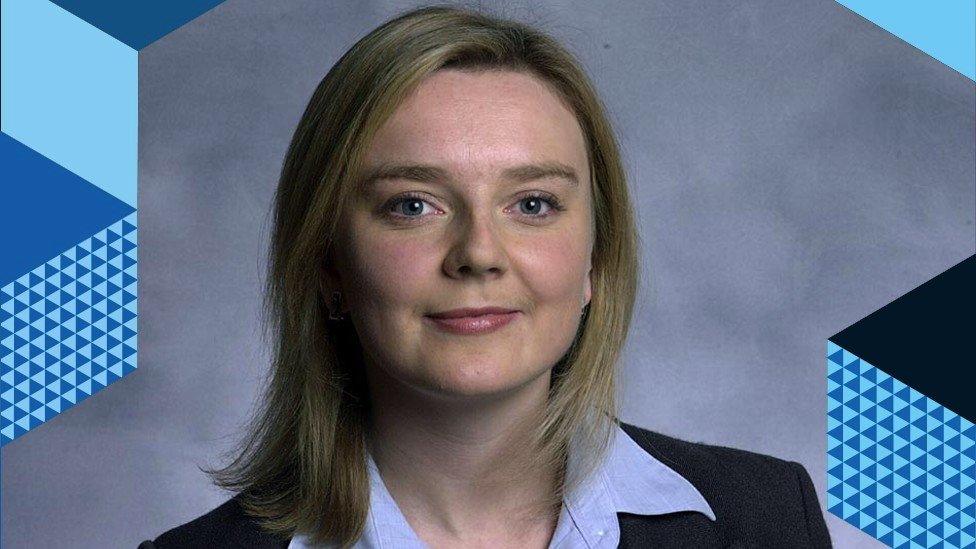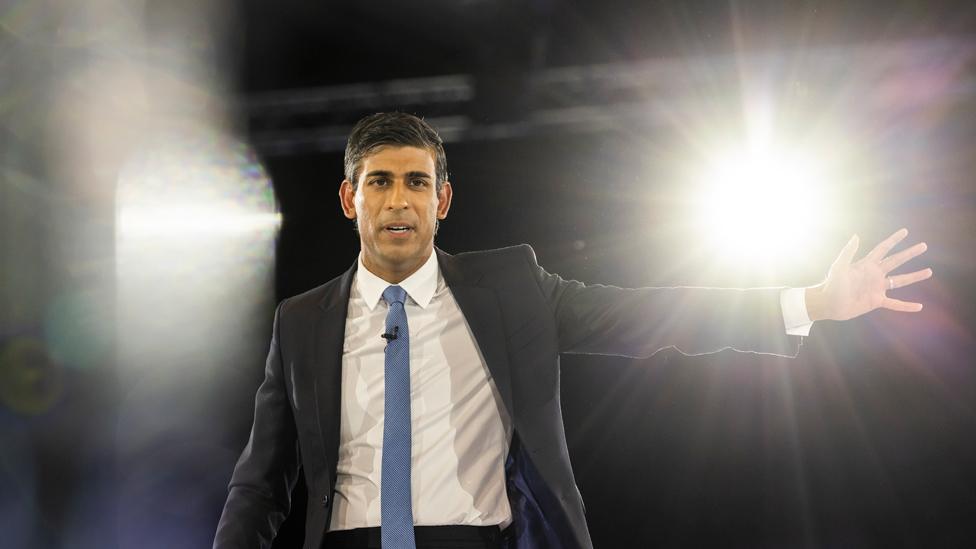Liz Truss pledges energy plan in a week if she becomes PM
- Published
Liz Truss promises to act immediately on bills and energy supply
Liz Truss has promised to announce a plan to deal with soaring energy costs within a week if she becomes prime minister on Tuesday.
The Tory leadership hopeful, the favourite according to pollsters, told the BBC's Laura Kuenssberg she would "act immediately" to help with bills.
But she offered no details, saying she would need time in office first in order to finalise exact proposals.
Her rival Rishi Sunak said he would target further payments at the poorest.
One of the two contenders will be announced as the next Tory leader on Monday, and will replace Boris Johnson in Downing Street the next day.
They have come under pressure to spell out how they would protect households with rising bills, as well as give help to businesses, which are not covered by the domestic price cap.
Speaking on BBC One's Sunday with Laura Kuenssberg, Foreign Secretary Ms Truss said action on energy bills would be "vital" for people and the economy.
She added that further support would need to go "hand in hand" with a plan to boost domestic energy supplies, arguing the UK had become too dependent on international energy prices.
Mr Sunak said further energy payments, beyond those he announced as chancellor, should be targeted at pensioners and the low-paid.
He has argued his suggested cut to VAT on energy bills would also provide some help for all.
He also said he couldn't rule out the prospect of blackouts over the winter to ration supplies, as the situation was "serious" and "every tool in the toolbox" would be needed.
"Of course we don't want to be in that situation, but I think it's responsible not to rule it out," he added.
Rishi Sunak says he can't solve the issue around energy bills for everyone
Ms Truss has promised to deliver around £30bn in tax cuts in an emergency Budget later this month if she wins, including a reversal of April's rise to National Insurance.
Pressed on whether richer people would benefit more from the cut, she said: "The people at the top of the income distribution pay more tax - so inevitably, when you cut taxes you tend to benefit people who are more likely to pay tax."
But she added: "To look at everything through the lens of redistribution I believe is wrong. Because what I'm about is growing the economy - and growing the economy benefits everybody.
"The economic debate for the past 20 years has been dominated by discussions about distribution. And what's happened is we've had relatively low growth".
Beyond his proposed cut to VAT on energy bills, Mr Sunak has taken a different approach, arguing permanent tax cuts should wait until inflation goes down.
Labour's shadow attorney-general Emily Thornberry said it was "extraordinary" neither candidate had given a "specific answer" about their energy plans during the weeks-long leadership race.
She added that people were "desperate" for help, and those on middle incomes as well as the poorest would struggle with rising bills.
Price freeze plans
Her party, along with the Liberal Democrats and the SNP, wants to freeze energy bills by paying energy companies to sell gas and electricity below market rates this winter.
The Lib Dems have said they will table a bill in Parliament next week on their plan - which will not be voted on, but could offer more detail of their proposals.
Ms Truss declined to say whether she might implement a price freeze, saying it would be wrong for her to give details of her plan before she is appointed.
Speaking to Sky News, SNP leader and Scottish First Minister Nicola Sturgeon urged Ms Truss to "cancel" further energy rises and give "substantial" support to business.
Mr Johnson's successor will be announced at 12:30 BST on Monday, before taking office on Tuesday after being formally appointed by the Queen.
In a break with tradition, the winner will travel to Balmoral Castle in Scotland for the ceremony, rather than Buckingham Palace.
The Queen has been suffering from mobility issues and it is understood the change was made to prevent the need for any last-minute rearrangements.

Follow Laura on Twitter @BBCLauraK, external

Related topics
- Published20 October 2022

- Published23 May 2024
